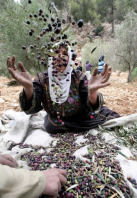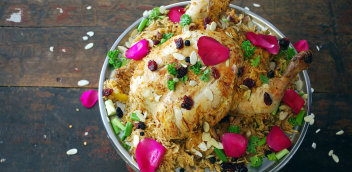
Olives being harvested for Zaytoun in Palestine
The community-interest company Zaytoun, producers of the first Fairtrade organic olive oil, recently marked the 10th anniversary of its olive harvest in Palestine. Food writer Joanna Blythman has praised the brand for “developing a market for artisan Palestinian food in the UK”.
Zaytoun’s products, including freekeh, matfoul and Medjoul dates, have found followers at River Cottage, Daylesford Organic and among chefs such as Sami Tamimi and Yotam Ottolenghi. Ottolenghi sells the dates from his online pantry and describes them as “a mighty ingredient to lavish leaf and nut salads, rice and couscous dishes, tagines or roasted delights.”
Blythman believes this produce genuinely merits the term ‘artisan’ as it provides an intriguing narrative about the people of “a fertile, beautiful country”. She also acknowledges that “West Bank farmers resolutely keep producing great food” and that “Palestine is carving itself a distinctive profile that stands out from the generic Middle Eastern pack.”
The attraction of this “distinctive profile” and the stories it evokes has brought the appeal of these once esoteric ingredients to a wider public. If the recent launch of the Silk Road Kitchen Cookery School in Dublin is anything to go by then people now not only desire Palestinian food but also want to know how to cook it.
Abraham Phelan has specialised in Middle Eastern and Mediterranean food for over 40 years and from The Silk Road Cafe has been delighting Dubliners for 14 of those. In response to persistent demand for cookery lessons he now runs Palestinian food courses, along with guest tutors, from a new purpose-built teaching kitchen.

A chicken dish made at Dublin’s Silk Road Cookery School
Many classes cost only €65, such as Middle Eastern Sweet Treats and Palestinian Brunch, where students will learn to prepare fried eggs with sumac, hummus and Labneh. The five-hour Middle Eastern Feast is €120 and offers a tantalising twist on Christmas dinner. Other classes showcase a single dish. For instance M’sakhan, which originates from the Tul-Karem and Jinin areas north of Bethlehem, is seductively spice-laden and the flavour is punctuated by the intoxicating sharp and zesty red berry-derived spice, sumac.
Rosalind and the team at Cookery School at Little Portland Street always guarantee an immersive experience and the four-hour Enticing Spices of the Middle East is no exception. £175 pays for a class with recipes that include tagines, traditional North-African fish chermoula and semolina cake. Students will also prepare mezze, with pitta, hummus, tzaziki and muhammara, a red-pepper and walnut dip popular in Lebanon, Palestine and Syria.
Swinton Park‘s, Middle Eastern Cookery is run by resident chef Stephen Bulmer who sees it as the “hot cuisine of the moment”. There is inventive use of typical Palestinian flavours in recipes such as slow-baked sweet onions with za’atar butter and parsnip purée and prawns with Sumac. A day course – £160 on weekends and £140 mid-week – culminates in the traditional Middle-Eastern-style feast, where a plethora of dishes are shared from vast platters.
Divertimenti, the culinary kings of Knightsbridge, offer three courses based around Middle Eastern cuisine. Jewish Flavours of Aleppo is a mere £65 and eschews the ersatz by staying loyal to the “precious flavours which have been kept alive by the ex-pat Syrian Jewish communities around the world”. Recipes such as ‘Aleppian Mujadrah with Laban’ (rice, lentils and caramelised onions with yoghurt) and ‘Samak bi’Tehineh’ (fish in tahini sauce), demonstrate this dedication.
Sabrina Ghayour, praised in the Observer by Shahesta Shaitly as the “golden girl of Persian cookery”, hosts Passage to Persia – a £115, three-hour class showcasing the “techniques and unique flavour combinations that makes the cuisine of Iran so very special”. One of many authentic recipes, “impressive enough for entertaining” include a Persian herb, walnut and barberry baked ‘frittata’ known as ‘Kuku Sabzi’.
Finally the critically acclaimed husband-and-wife team behind the recently opened West End smash, Honey & Co present Food from the Middle East. Itamar Srulovich and Sarit Packer will personally drop in between 7 and 9.30 pm, for which £65 will grant each guest an insight into their favourite “homely, fragrant, vibrant and delicious” recipes.
Rachel and the team at Demuths in Bath describe Middle Eastern food as “a delight for vegetarians”. In Flavours of the Middle East the spiced trail is well-trodden in recipes such as traditional Turkish Imman Bayaldi, Lebanese lentil-dish Moudardara and Armenian Lavash bread. The recipes are many, the cost at £150 great value and it is all topped-off at the table with tasting, talking and organic wine.
Our featured recipe comes from Green Kitchen Stories. Their stunning website is a treasure trove of colourful, nutritious, veg-packed recipes, often with an ethnic slant, and below is their Palestinian pièce de résistance which features Za’atar. This herb mix of wild thyme, toasted sesame and sumac is part of the Zaytoun product range, which Ottolenghi also sells online and suggests is “Perfect as a dip with Palestinian olive oil and freshly baked bread. This zesty seasoning is served at breakfast in many Middle Eastern countries – can be used with meat, fish, cheese, eggs or sprinkled on a pizza”
In this case, it becomes the centre-point of a nourishing chickpea, freekeh and aubergine salad:
Chickpea Za’atar Salad
Serves 4
1 cup / 240 ml raw chickpeas / garbanzo beans
1 cup / 240 ml freekeh (cooked according to packet instructions)
2 aubergines / eggplants
2 tbsp cold-pressed olive oil or coconut oil
1 tsp cumin seeds
1 tsp ground sumac (buy in middle eastern store)
4 tomatoes
1 handful fresh flat-leaf parsley
2 tbsp cold-pressed olive oil
1/2 lemon, juice
2-3 tbsp Za’atar spice blend (recipe below)
1/2 cup (150 g) goat’s cheese, crumbled
Soaking and cooking chickpeas: Place chickpeas into a bowl, cover with twice as much water and let soak overnight. Rinse and drain, place in a cooking pot, cover with water – twice the amount of chickpeas – add a pinch of salt and pepper and cover. Bring to a boil, then remove the lid, lower the heat and let simmer for approximately 1 hour. Test to see if tender. Cooking times may vary. Drain and allow to cool.
Roasting the aubergine: Preheat the oven to 200°C / 400°F. Cut the aubergine into 1/2-inch / 1 cm squares. Place on a baking tray, drizzle with olive oil, sumac and cumin seeds and toss with your hands so every aubergine are lightly coated in oil and spices. Bake in the oven for around 20 – 30 minutes or until golden and soft.
Making the salad: Mix cooked chickpeas, cooked wheat berries, roasted aubergine, tomatoes, parsley, olive oil, lemon juice and Za’atar in a large serving bowl. Toss with your hands until well combined, sprinkle with goat’s cheese. Serve.
Za’atar Spice Blend
4 tbsp lightly toasted sesame seeds
4 tbsp ground sumac
2 tbsp dried thyme
1 pinch of sea salt
(1 tbsp ground cumin is a really nice addition, but optional)
Making the Za’atar: Place sesame seeds on a skillet and gently toast on low heat while stirring. Remove from heat, allow to cool and mix with the rest of the spices. Place in an airtight glass jar. Keeps for months.
